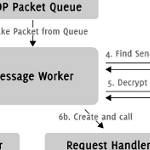
Android Example: Communication between Activity and Service using Messaging
I recently wrote my first little app for my Android smartphone and I was surprised how easy it was. Being familiar with regular Java, learning the new Android APIs was very simple for the most part. However, there was one thing that wasn’t particularly straight forward: communicating between an Activity, i.e. the user interface, and a background Service started by the application. After many hours, I found some sample code on Stack Overflow which I used to create a very generic reusable solution to start, stop and communicate with your own Service implementation.










Recent Comments